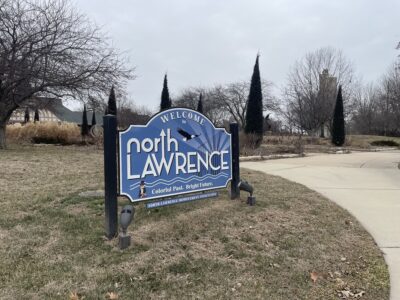With less money in city’s housing trust, Housing Stabilization Collaborative puts new limits on its rent and utility aid program

photo by: Austin Hornbostel/Journal-World
The Douglas County Human Services Building, 2518 Ridge Court, is pictured Tuesday, Sept. 6, 2022.
Two years ago, in 2023, an organization that helps Douglas County tenants afford their rent and utility payments was watching its biggest funding source dry up.
The organization was the Housing Stabilization Collaborative, and the funding source was the torrent of COVID-19 relief dollars. HSC had distributed $1.8 million in rent and utility assistance funded by local sources from March of 2021 to November of 2022, in addition to the millions in rental aid coming into Douglas County from the state. But in January 2023, when the COVID aid was about to end, the organization had about $890,000 available to distribute for the rest of the year, and it had to change its operations — including implementing a lottery system instead of a first-come, first-served approach — to make the most of its funds.
For a while, it seemed that the HSC had stabilized itself and could keep serving the community with local government funding. But now, the organization is staring down another funding hole — this time from the local government money it now relies on.
Last year, the HSC received $509,000 from the City of Lawrence’s affordable housing trust fund to use for rent and utility assistance. But this year, its award has fallen to $200,000 — a 61% drop.
The reason has to do with another decision made back in 2023 — this one by the city’s Affordable Housing Advisory Board, which oversees the trust fund. And the ramifications for the people the HSC serves are much stricter limits on who is eligible for aid, and how much they can receive.
• • •
The decision about the affordable housing trust in 2023 wasn’t a decision to cut back. In fact, it was a decision to spend bigger.
The affordable housing trust, which provides money for a wide range of housing initiatives in Lawrence, is funded by a special sales tax that was approved by voters in 2017 that was projected at the time to generate roughly $1 million annually. By April 2023, as the Journal-World reported, the trust fund had close to $2 million in reserves, and the Affordable Housing Advisory Board didn’t want it sitting around unused.
At that time, Douglas County Commissioner and advisory board member Karen Willey said it didn’t make sense to hold onto the funding if the cost of building new housing was only going to go up.
“I don’t see a value in holding for the purpose of holding,” she said, adding that “our job is to spend these dollars.”
The majority of the board seemed to agree. The board voted 8-3 to recommend that the city make the entire trust fund amount available for projects in 2024.
Lea Roselyn, the city’s affordable housing administrator, told the Journal-World via email that this meant 2024 was a year of larger-than-average awards. For 2024, she said, there was $2,984,000 available to distribute in the trust fund. For 2025, by comparison, the fund had just $1,200,000 to distribute.
• • •
At the time of that decision in 2023, Roselyn and the other affordable housing leaders were thinking a lot about building new housing. Roselyn said then that the extra awards would help make progress on the city’s goals for new affordable housing units, which included building 1,500 new units of affordable rentals and 500 units of affordable homes for ownership over five years.
The problem for the HSC, however, is that its rental assistance program isn’t a one-time building project. It requires constant payments to people in need of assistance, and now the process for allocating those payments will have to change.
The HSC leadership is currently in transition — a memo from county staff this past week to the Douglas County Commission said that the county’s new housing program manager, Kristen Egan, only began work on May 5.
But the memo also said the HSC membership had convened to discuss how to manage the funding, and it reached a consensus on changing its procedures. The memo said that without such a change, the funding would likely be depleted by late July or August.
Most notably, there will be stricter limits on who is eligible to apply for aid.
Previously, residents at or below 50% of the area median income could apply online for the rent and utility assistance, and the recipients were selected through a lottery held every two weeks. Priority was given to those facing eviction or utility shutoffs.
Now, the only people who will be eligible to apply are those who are at immediate risk of eviction or have already had their utilities shut off.
A notice on the HSC’s website, labeled “IMPORTANT PLEASE READ,” says that only applications with an eviction court date, eviction notice or disconnected utilities at the time of applying will even be eligible for the lottery. Furthermore, the lottery itself will be held less frequently. Instead of every two weeks, it will now take place on a monthly basis, on the third week of each month.
The next lottery is scheduled for Tuesday, May 13, and those eligible can apply for it at dgcoks.gov/administration/housing-and-human-services/housing-stabilization-collaborative.
There will also be cutbacks on how much rent the program will pay each time a person is selected. Previously, the HSC used to provide an extra month of rent for some applicants, but now the memo says it will only pay the current month’s rent.
Some things about the program won’t change. The memo says the program has “monthly set-asides” for special populations, including seniors, individuals fleeing domestic violence, Spanish-speaking households and applicants in Baldwin City, Eudora or Lecompton, and these won’t be affected.
But another thing that the HSC isn’t expecting will change is demand.
The HSC provided data to county commissioners outlining just how high the demand for this funding is among local renters. It calculated how many applications it received for each month, along with the amounts requested for rent and utilities. In total, the average amount of aid requested for just one month is $403,446. If HSC were to grant all of those requests, that would burn through almost 70% of the total funding that it has available for 2025.
In 2024, the peak for applications occurred in January, with 416 applicants, followed closely by August, which saw 413 applicants. In total, 555 individuals received funding through the program last year.
Many of the households that previously were eligible to apply are no longer eligible, and some who are eligible won’t be selected in the lottery. HSC has said that people who are at risk of eviction but don’t receive funds will be encouraged to contact the Douglas County District Court Self-Help Center, Kansas Legal Services or Kansas Holistic Defenders for help with their cases.
• • •
In her email to the Journal-World, Roselyn emphasized that it wasn’t specifically HSC’s funding that was cut. There was less funding available in the trust for all projects, and the percentage of the trust’s total awards going to the HSC remained almost the same, from 17% of the trust’s awards in 2024 to 16% in 2025.
“The amount we can support in grant awards is directly tied to the amount we have available to award,” Roselyn said. “The percentage of the HSC reduction from 2024 to 2025 mirrors the percentage reduction of (trust fund) funds available to award in the same time period.”
But the effect for HSC is the same — a big chunk of its budget gone. And it will have to wait for a while for governing bodies to decide whether they’ll fill some of that gap in 2026.
In 2024, Douglas County allocated $330,000 for the HSC, and the trust fund contributed $509,000. There was also $50,220 from Lawrence’s Community Development Block Grant, which is a federal HUD program that provides communities with resources to address a wide range of community needs.
This year, while the funding from the county remained consistent at just over $330,000, the money from the trust fund decreased to $200,000. The block grant funding was also down, but only slightly, with $49,665 in funding set aside for this year, according to a memo to county commissioners.
A county spokesperson told the Journal-World that the HSC’s funding for 2026 will be a part of the County Commission’s budget deliberation process in July.
Roselyn said recommendations for 2026 awards for the Affordable Housing Trust Fund will be made by the advisory board this fall. Because the fund is designed as one-time project-based grants recommended by the advisory board rather than ongoing program support recommended by staff, it is difficult to determine future award projections, she said.
“When the Affordable Housing Trust Fund has fewer dollars to award, it comes at the expense of achieving the goals we are all working towards together,” Roselyn said. “As the need for affordable housing has grown, overall city investments in affordable housing have decreased. When affordable housing investments decrease, it comes at the expense of our collective goals for increasing affordable housing.”
Roselyn said the problems that the city faced in keeping people housed were communitywide problems and would take a collaborative effort to solve.
“We are all in this together, working collaboratively to end chronic homelessness, keep people housed, and build long-term stability through affordable housing,” Roselyn said.







